
Adriana Salvatierra Arriaza is a Bolivian political scientist and politician who served as president of the Senate in 2019. A member of the Movement for Socialism, she served as senator for Santa Cruz from 2015 to 2020 and was a substitute senator for Santa Cruz under Carlos Romero in 2015. At age twenty-nine, Salvatierra was the youngest legislator and third woman to hold the presidency of the Senate and was the youngest individual to ever exert presidential authority, albeit briefly in an acting capacity.
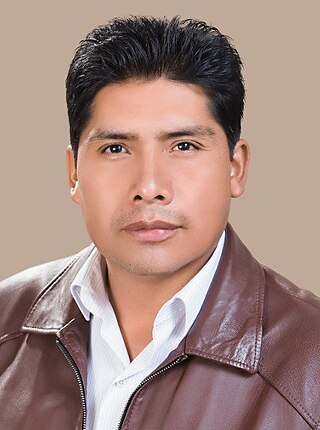
Franklin Richar Flores Córdova is a Bolivian politician, trade unionist, and former student leader serving as general manager of the Food Production Support Enterprise since 2021. A member of the Movement for Socialism, he previously served as a member of the Chamber of Deputies from La Paz, representing circumscription 18 from 2015 to 2020. Before that, he served as a Sica Sica municipal councillor from 2010 to 2014, during which time he held office as the body's president. In 2021, Flores was his party's candidate for governor of La Paz, placing second in that year's gubernatorial election.

Yesenia Yarhui Albino is a Bolivian lawyer, politician, and former student leader who served as a party-list member of the Chamber of Deputies from Chuquisaca from 2015 to 2020. An activist forged in the student movement, Yarhui entered politics in 2014 as a candidate on the Christian Democratic Party ballot. Elected in that year's general elections, Yarhui was just 19 years old upon her entry into the Chamber of Deputies, making her the youngest parliamentarian in Bolivian history.

Luis Gallego Condori is a Bolivian lawyer and politician who served as a member of the Chamber of Deputies from Potosí, representing circumscription 39 from 2010 to 2015.

Carol Mireya Montaño Rocha is a Bolivian lawyer, politician, and trade unionist who served as a member of the Chamber of Deputies from La Paz, representing circumscription 11 from 2015 to 2020. A member of the Movement for Socialism, Montaño entered politics as head of the party's youth wing in El Alto, later serving as secretary of organization of the Federation of Neighborhood Councils. Her party's alliance with El Alto's neighborhood councils facilitated Montaño's entry into the Chamber of Deputies. In 2009, she was elected as a substitute deputy representing La Paz's circumscription 14 and in 2014, she became one of the few ruling party parliamentarians to be presented for reelection, this time for a full seat.
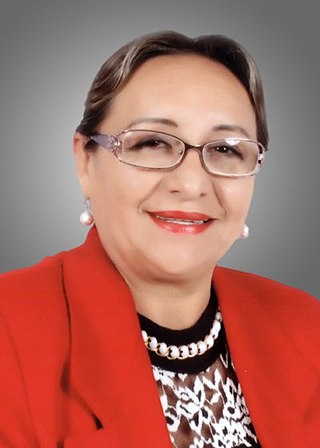
Irma Herminia Ledezma Tambo is a Bolivian businesswoman, politician, and rancher who served as a member of the Chamber of Deputies from Beni, representing circumscription 61 from 2015 to 2020. Ledezma spent most of her professional career in the business of commerce and cattle ranching, two sectors vital to Beni's regional economy. She entered politics as a member of the Social Democratic Movement, representing the party in the Chamber of Deputies and serving as head of its Guayaramerín branch until 2020 before retiring upon the completion of her parliamentary term.

Tito Veizaga Cossío is a Bolivian cocalero activist, politician, and trade unionist who served as a member of the Chamber of Deputies from La Paz, representing circumscription 17 from 2015 to 2020. A member of the Movement for Socialism, Veizaga followed the usual path taken by rural union leaders, scaling the ranks of trade syndicate leadership until reaching the departmental level. In 2004, he was elected to serve as mayor of Cajuata, and though he failed in his attempt at reelection in 2010, he maintained a presence in his party's internal structure. In 2014, Veizaga was elected to represent the Yungas region in the Chamber of Deputies. Though many local cocaleros opposed the government's attempt at regulating their crop, Veizaga held the party line, supporting the passage of the 2017 General Law of Coca. He was not nominated for reelection.

Miguel Santa Lucía Ojopi Sosa, often referred to as Yaco, is a Bolivian businessman and politician who served as a party-list member of the Chamber of Deputies from Pando from 2015 to 2020. A member of the Revolutionary Nationalist Movement, Ojopi entered politics as the party's departmental leader for Pando. In 2006, he was elected to serve as a party-list member of the Constituent Assembly for Pando from 2006 to 2007. After unsuccessfully contesting the Cobija mayoralty in 2010, Ojopi was elected to represent Pando in the Chamber of Deputies. As with other Revolutionary Nationalist Movement deputies elected as part of the Democratic Unity alliance, Ojopi split with the coalition shortly after assuming office, composing part of a quaternary opposition caucus in the lower chamber for the duration of his term.
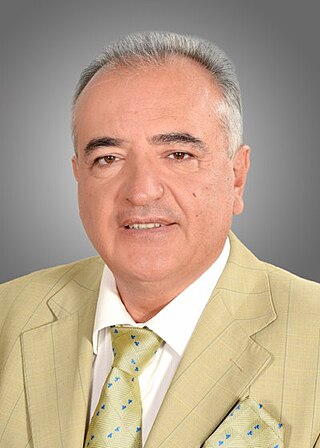
Miguel Ángel Feeney Parada is a Bolivian businessman, lawyer, and politician who served as a party-list member of the Chamber of Deputies from Santa Cruz from 2015 to 2020. As with many members of Santa Cruz's upper-class economic elite, Feeney's career began in the department's agribusiness sector before moving on to public service. Originally a partisan of Nationalist Democratic Action, Feeney switched allegiances to the National Unity Front in the mid-2000s, serving as the party's departmental leader for Santa Cruz. In 2006 and 2009, respectively, he unsuccessfully sought to be elected to the Constituent Assembly and the Chamber of Deputies before finally attaining the post of deputy in the 2014 election.
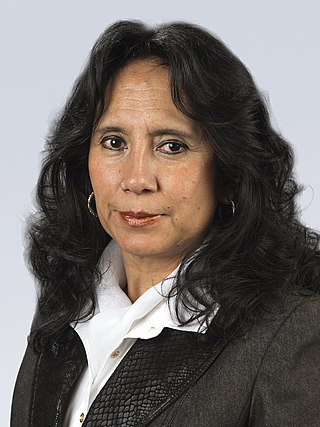
Mirtha Natividad Arce Camacho is a Bolivian academic, lawyer, and politician who served as senator for Tarija from 2015 to 2020.
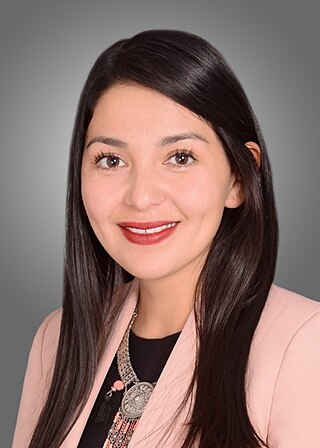
Shirley Franco Rodríguez is a Bolivian political scientist and politician who served as a party-list member of the Chamber of Deputies from Cochabamba from 2015 to 2020. She previously served on the Cochabamba Municipal Council from 2010 to 2014.

Lidia Patty Mullisaca is a Bolivian politician and trade unionist. A member of the Movement for Socialism, Patty represented La Paz in the Chamber of Deputies, first as a substitute alongside Manuel Canelas from 2015 to 2018 and later as a voting member until 2020. She later served as consul of Bolivia to Puno, Peru, in June 2023 and has been vice consul of Bolivia in La Plata, Argentina, since September 2023.

Otilia Choque Véliz is a Bolivian community organizer and politician who served as a party-list member of the Chamber of Deputies from Oruro from 2015 to 2020.
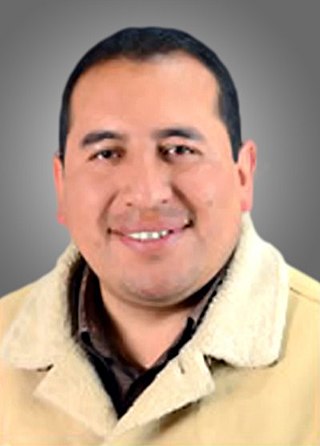
Wilson Pedro Santamaría Choque is a Bolivian lawyer, politician, and sociologist who served as vice minister of public security from 2019 to 2020. A graduate of the Higher University of San Andrés with extensive postgraduate studies, Santamaría entered the political field as a partisan of the National Unity Front and served as the party's municipal leader for La Paz. In 2014, he was elected as a party-list member of the Chamber of Deputies, representing the La Paz Department from 2015 to 2019.

Celia Andrea Bonilla Gemio is a Bolivian agricultural worker, politician, and trade unionist who served as a party-list member of the Chamber of Deputies from La Paz from 2015 to 2020. An ethnic Afro-Bolivian, Bonilla's career got its start in northern La Paz's agrarian trade unions, where she held positions as an executive and women's representative. Her prominence there aided in her nomination on the Movement for Socialism's 2014 party list, through which she was elected to the Chamber of Deputies. As a legislator, Bonilla holds the distinction of being the first Afro-Bolivian woman in Bolivian parliamentary history to serve in the lower chamber. She is, together with Ancelma Perlacios, one of the first two Afro-Bolivian women in parliament, and is one of just three overall, after Jorge Medina.
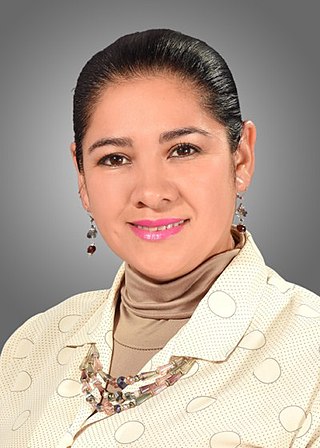
Kary Mariscal Guzmán is a Bolivian schoolteacher and politician who served as a member of the Chamber of Deputies from Santa Cruz, representing circumscription 54 from 2015 to 2020. A member of the Revolutionary Nationalist Movement, Mariscal spent much of her life working in education, only entering the political field in 2010 with her election as a substitute member of her city's municipal council.

Orlando Egüez Algarañaz was a Bolivian lawyer and politician who served as a member of the Chamber of Deputies from Beni, representing circumscription 60 from 2015 until his death in 2019. A member of the Revolutionary Nationalist Movement, Egüez practiced law in Riberalta before making the jump into politics. Elected to the Chamber of Deputies in representation of the Democratic Unity coalition, he joined other members of his party in breaking away from that caucus once in office. Although the move garnered Egüez some high-up committee positions, a 2016 cancer diagnosis impeded his ability to legislate, and he died in office three years later.

Zacarías Colque Matías was a Bolivian agricultural worker, politician, and trade unionist who served as a member of the Chamber of Deputies from Potosí, representing circumscription 38 from 2015 to 2020. A member of the Movement for Socialism, Colque built his career in northern Potosí's rural trade syndicates. The party's long-established alliance with the agrarian sector facilitated Colque's entry into politics, first as a member of the Caripuyo Municipal Council and much later as a parliamentarian.

Bernard Osvaldo Gutiérrez Sanz is a Bolivian lawyer, politician, and former television presenter who served as senator for Cochabamba from 2010 to 2014 and as a party-list member of the Chamber of Deputies from Cochabamba from 2015 to 2020.
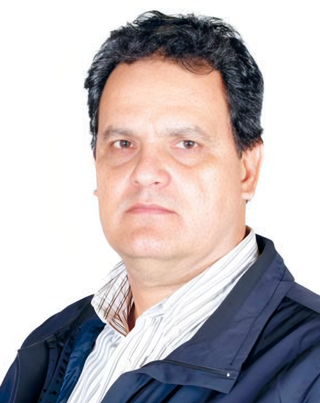
Carlos Alberto Sonnenschein Antelo is a Bolivian businessman, politician, and rancher who served as senator for Beni from 2010 to 2015. A member of the Revolutionary Nationalist Movement, he previously served as a member of the Chamber of Deputies from Beni, representing circumscription 64 from 2002 to 2010.






















